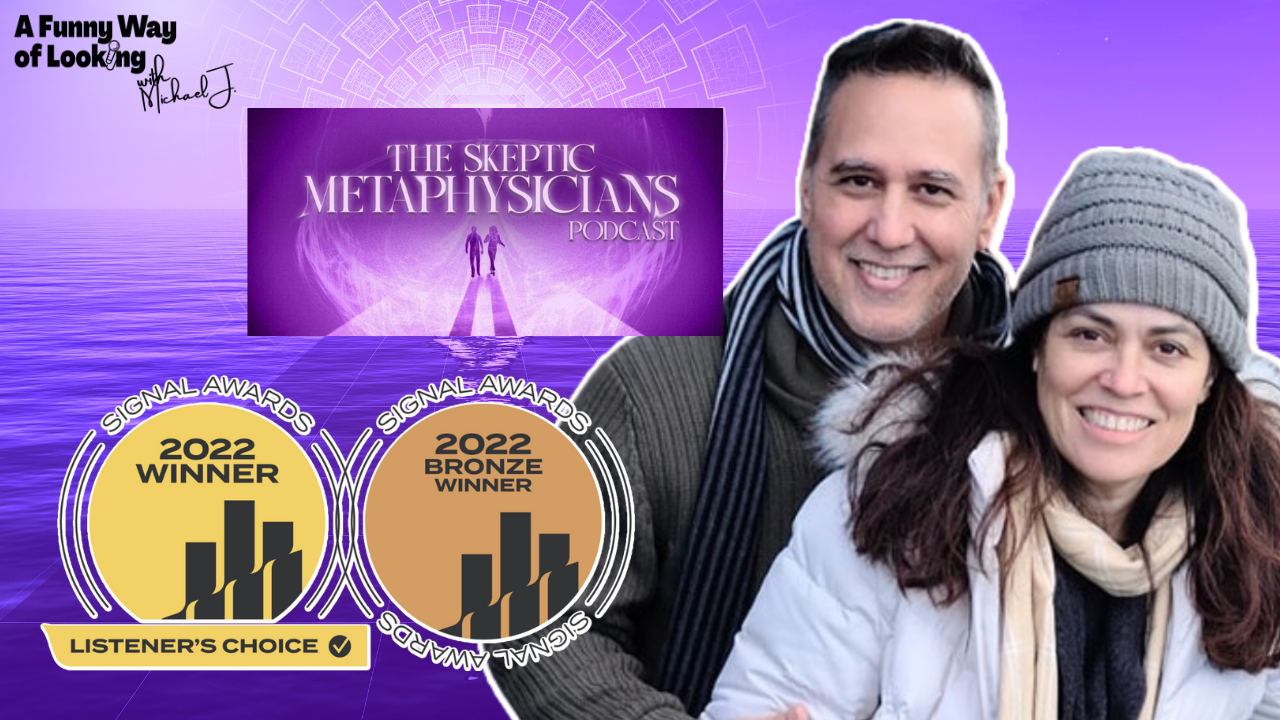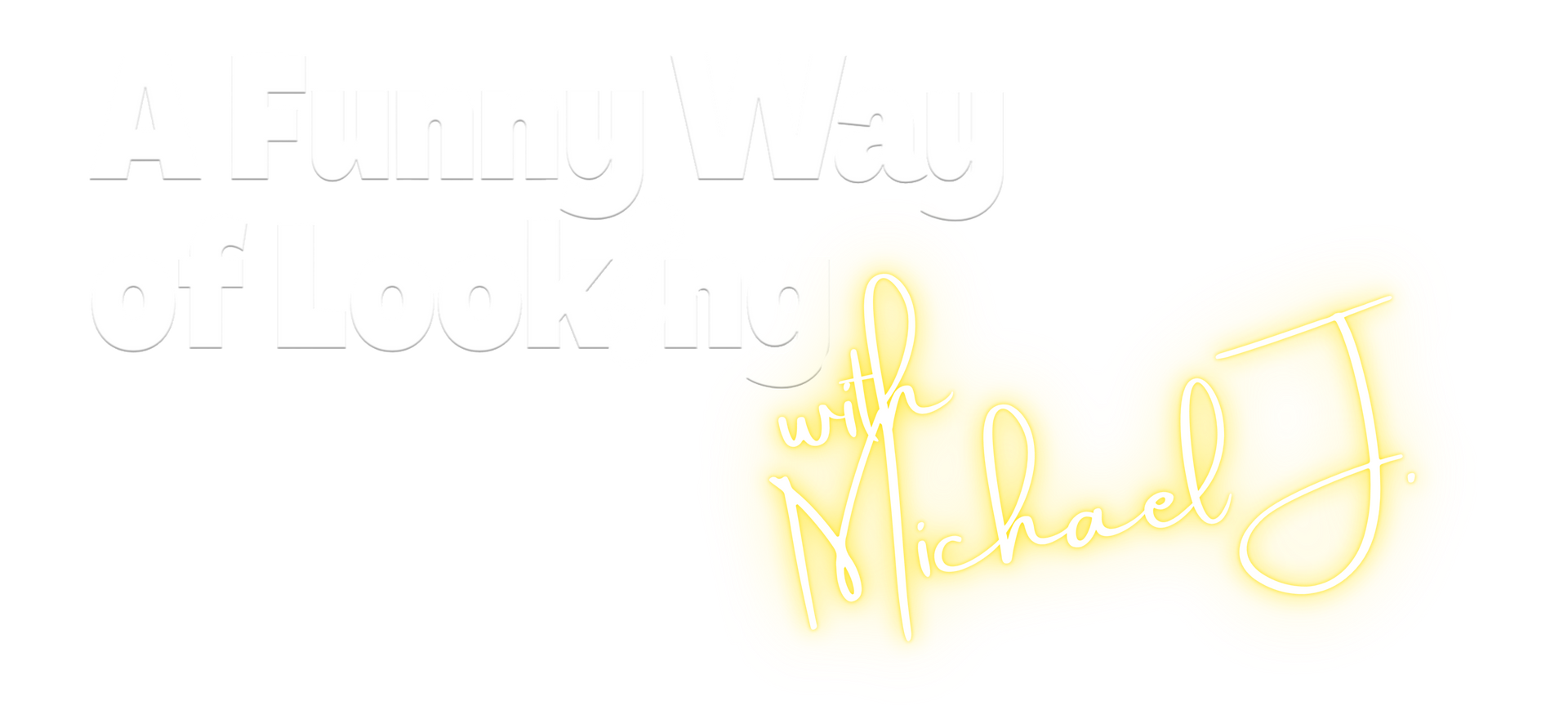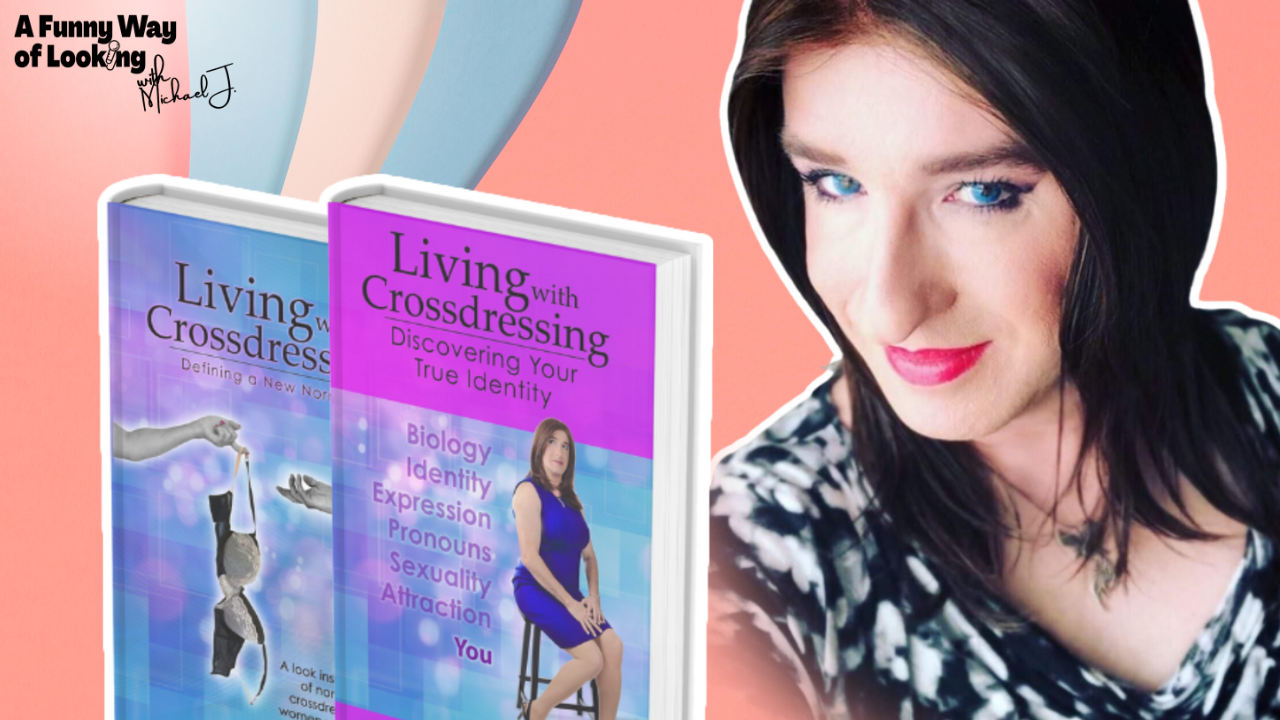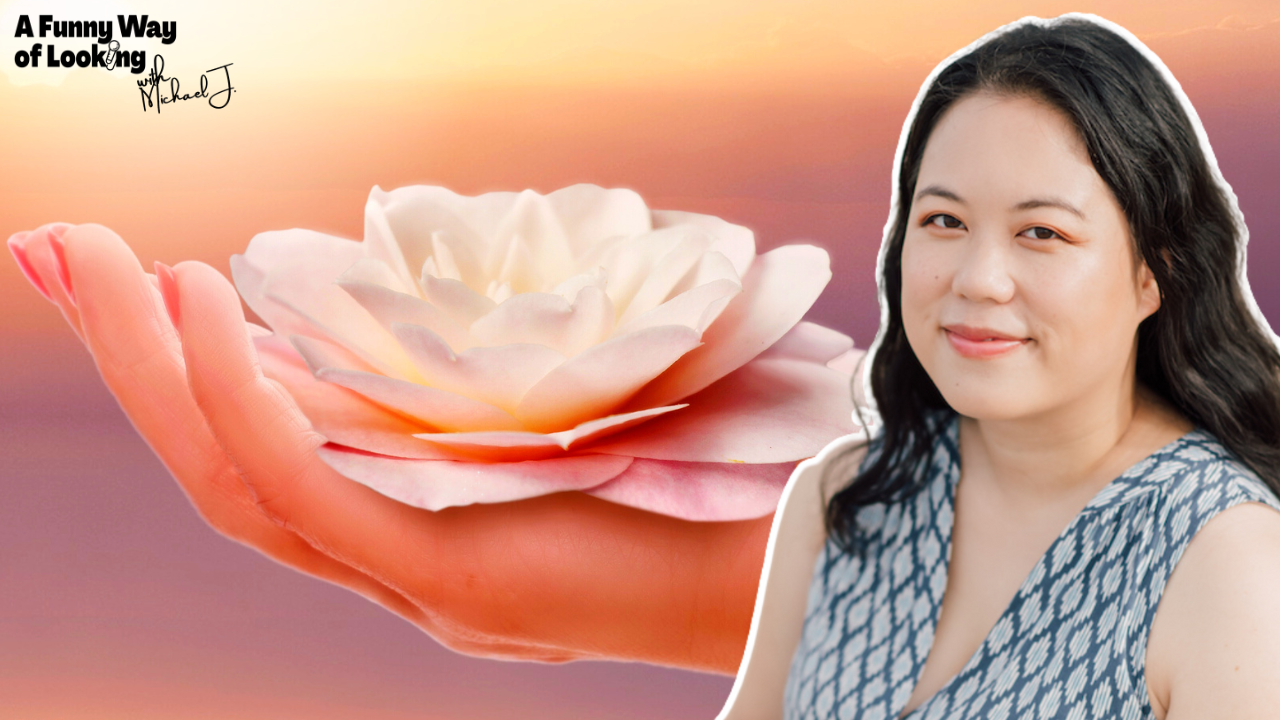Stroke of Resilience: An Author's Triumph with Angie Read
Angie Read is a driven and devoted mother of three who had a massive stroke at 46. She shares her story of recovery from the unexpected mental health fallout, and the tips and tools that helped her survive–because no one should struggle alone!
A Funny Way of Looking with Angie Read
MICHAEL J: Today, we're joined by Angie Read, a tenacious and devoted mother of three, who at the pinnacle of professional life experienced a massive stroke. This journey, however, isn't just about the physical aftermath of a stroke. It's about resilience and confronting the unspoken mental health challenges that can arise in its wake.
With over 25 successful years and public relations and author of invisible scars, stroke, survival, recovery and the unexpected mental health. And his life took an unexpected detour that reshaped her perspective and mission.
So now she channeled her experience into advocacy, aiming to ensure that no one navigating the tumultuous waters of post stroke recovery feels alone through her books and talks, and she is illuminating a path of healing, understanding, and renewed purpose.
Today, we'll delve into her story on the earthing lessons that resonate far beyond the world of stroke survivors, touching the hearts of universal human experience and challenges and jobs, and life in general.
Life definitely throws us curveballs, you know, every once in a while in your case, it was an unexpected stroke. So, can you just share a little bit about what led up to that moment?
It's not like, “Hey, I think I'm gonna have a stroke.” I want to know what happened. How's that comparable to the challenges that many of us face in our lives?
ANGIE: I was unaware because I was otherwise a very healthy woman. I was 46 and active and healthy and didn't have any real risk factors. I've never smoked and have high blood pressure or high cholesterol or any of the major risk factors.
I had never had a doctor say, “Hey, you need to cut back on something to eliminate or to decrease your risk of stroke.” So it really was a huge surprise. A few days prior to my stroke, I had a massive migraine and I've suffered from migraines since I was 16.
This particular migraine lasted over the course of two days and landed me in the ER. I had to go in for an IV cocktail just to knock that my brain down. And that I'd never had to do that before in my life even though I've always suffered from migraines.
So I was in the hospital in the ER two days before my stroke. They had done a CAT scan on me or a CT scan and there was nothing showing any abnormalities. The reason they did that CT scan in the ER was that my migraine was a little bit different than it had been in the past.
I usually get migraines with auras, which means I see a blind spot that's like the shape of a C in my right eye. While on this particular weekend. It lasted two days and the second day of the migraine my blind spot was like three times bigger than it had ever been.
But in the end, the ER didn't see anything unusual. They just gave me an IV cocktail of fluids.
MICHAEL J: We just talked about your husband, finding you and knowing what the signs were, what was the immediate thing that happened to you? And what were the steps that were taken immediately?
ANGIE: It was 6:30 in the morning, my alarm went off. So I could get up and take a shower and go to work. And I just couldn't get out of bed. It was just the weirdest thing.
I couldn't put the pieces together. In my mind, I just knew that. I have some reason I couldn't get out of bed. And I was kind of shaking or moving awkwardly to try to get myself out of bed.
One whole side of your body doesn't work. It wasn't painful or anything. It just wouldn't respond to the signals my brain was sending it. And I guess I was shaking the bed a little bit.
And my husband woke up and said, “What are you doing?” And I said, “Trying to get up and take a shower. And he said, “Are you drunk?” Because my speech was all garbled. I was like “It's 6:30 in the morning. No, I'm not drunk.”
And still, he wasn't understanding me. So he got up out of the bed, went over to the light, turned on the light and said “Your face looks like it's sliding off on the left. You're having a stroke. I'm calling 911.”
And of course, I was like “No, don't call 911. I'm sure I'm just still half asleep.” I mean, a forty six year old healthy woman wakes up having a stroke. It didn't make any sense. But luckily he didn't listen to me and called 911 immediately.
Within two minutes, we lived really close to a station and they got there and took me to a hospital. They did a CT scan and saw two clots.
Then they rushed me down to St. Luke's on the Plaza, which is in Kansas City and St. Luke's is a specialized hospital and stroke. And thank God I got there when I did as quickly as I did.
The doctor who was on call that morning said that the neurosurgeon specializes in a medical thrombectomy surgery, which is a laser guided scope that goes up through one of your arteries and goes into your brain and just puts like shoots through the clot and comes back down and pulls it out.
MICHAEL J: They went literally from the groin all the way up to the brain. To destroy the clot and pull it out.
ANGIE: I was awake for that surgery. I mean, I only recall bits and pieces. But I do recall at one point going, I had my head hurt really bad. And the doctor or nurse or somebody said, “Yeah, we're retrieving the clot. So that's why your head hurts.”
MICHAEL J: Let's talk about after surgery. What were you thinking this whole time now that you know you've had a stroke? What was the next thing that happened in your mind?
ANGIE: The next thing that I can remember was just a nurse saying can you lift your left arm and I was able to lift it? And it was like a miracle because I couldn't lift it an hour prior to that and I couldn't do anything on my entire left side.
Well, I think I was in shock because I wasn't scared. I wasn't in any kind of pain, which is awesome. I’m still like this can't be happening to me. It was just so surreal.
MICHAEL J: It's a very scary story right there. And when you start to have to do recovery, because I know now in the hospitals, they get you up and walk around like immediately. What was your recovery like?
ANGIE: I was in the neuro ICU for two days. And then they would test my swallow reflex because I like that the left side of my face was paralyzed for a couple of hours.
I lost muscle control on that side of my throat. So they first want to make sure that you can swallow before they give you anything to drink.
Then it felt like every hour or even more often, the doctor or nurse would come in and make me squeeze something with my left hand and then squeeze with my right and then kind of to test out my strength on my left side and what I was able to do.
Then they would have me push my feet against the doctor's hands and kind of test my left foot and then a few days later, they moved me to my own room on a stroke floor.
I would get up and go. They would take me to physical therapy and try to have me walk down the hall. And then they had these little stairs in the physical therapy room. I could walk up these two stairs and then walk down them and hold on to a grip bar while I was doing it.
MICHAEL J: So you've got the physical stuff going on. It sounds like you were amazingly, like fortunate that you got to the hospital so fast and that you started doing the physical therapy.
At some point, when did the mental part of this kick in you go like, “Oh my God, my life has changed. I had a stroke. And I've got to figure out, how do I move forward?”
ANGIE: I don't know exactly. I think I was definitely in shock for a couple of days because I was still responding to phone calls and posting on Facebook. It probably didn't really kick in until I saw well, until I saw my kids.
They all came up and they weren't little kids. They were teenagers at this point. But just to see their reaction and then my family like my mom, my dad was able to come up with my stepmom and my sisters.
Once I kind of saw everybody's reactions, I think it kind of hit me that this really did happen to me. And it was very scary. I wasn't as scared as my family members were.
I think it's once I saw everybody's reactions, it hit home and then I think by the time when I got home I think they let me go home four days later. And it was when I was trying to walk up the stairs to go to my bedroom and I had to use a cane for a while to stand myself.
It was very scary to go up the stairs. And then once I got up to my bedroom I kind of stayed up in my bedroom area for a couple of days before I tried to go down the stairs again because it was scary.
That's when I think it really kicked in was when I tried to go back home and start living and just being out of the hospital when you have such a health crisis and you've got this medical team around you.
You feel safer because they're there to watch for you know all the things that can go wrong but once you're home, you're kind of out of that safety net. And it's a little scarier.
MICHAEL J: You've written a book. You've written a couple books. And how do you translate what happened to you into what others might face on a daily basis that didn't have strokes, but they've had other things that have happened in their lives that just are debilitating like that? And how do you take the stroke lesson and translate that into everyday life?
ANGIE: I would say just always take care of your health as much as you can, because you never know when you're going to need that strength and your body to fight off whatever is happening.
“
The message I mostly want to send is that mental health is so important, because about two months after I had my stroke, I tried to go back to work. I felt like I physically recovered 100%. And I felt like, hey, I conquered this stroke thing, time to get back to work. And I was not ready, emotionally, or mentally, I didn't realize that I was about to be hit with debilitating anxiety and depression, that just rocked my world.
I've suffered from minor anxiety before in my life and had been on medication for anxiety. I had never had depression to the point where I really couldn't function.
It hit me so hard and fast, because I got to work. And I couldn't concentrate. I would sometimes find myself at the bottom of the staircase in a fetal position rocking like with my arms around my knees just rocking back and forth.
I just felt like I couldn't handle life. I was just like, just make it all go away, just please make it all go away. And I've never experienced that before.
I know so many people struggle with their mental health. And it's very important to understand that approximately 50% or more of stroke survivors or even heart attack survivors will have mental health issues following their incident.
It's not just because of the traumatic incident that happened to you, although that can cause mental health issues. But it's also because of the chemical changes in your body and the chemical changes in your brain.
The scary thing is you survive a stroke to hopefully go on and live a happy healthy life after that and, and be productive again. But when you're hit with mental health and mental health disabilities, it hinders your ability to grow and to be able to heal properly.
MICHAEL J: You went right back to work as soon as you could. And you were saying to yourself, “I'm okay, I want to go forward and everything,” and you kept pushing your life, I want to tie this into something else that you and I talked about recently.
In your latest episode, where you recently got laid off from your job. And all these things, you are a very go go go person. How has this changed you in such a way that life is not about I've got to go to work?
These are the things that make me valued in this world? And how did you take all this stuff and like, “Wait, I've got some mental problems myself.” I just need to start taking care of myself.
So talk about that, because that's really what I'm hearing. The story here is how to take care of yourself.
ANGIE: When I had my stroke, and I thought, especially after I went back to work, and didn't feel like I could function, didn't feel like I could do my job, I thought my brain was broken.
I ended up having to take Disability Leave and go on short term disability, again, because I had to be hospitalized twice for mental health issues, and to get some crisis intervention.
Because I contemplated taking my life one night, the scariest thing that's ever happened to me, but once I really thought I could never go back to work and never work in communications again, because of course, your brain catastrophize is everything.
Other than work, I was just always kind of a workaholic and just always wanted to climb the next rung on the career ladder. I was always like, “what's my next accomplishment, what's my next big move?”
And then when I thought I had lost that, and I would never be able to return to communications again, I didn't know who I was. And I was so lost. And that fed into my mental health conditions. I mean, that was like fuel to the fire. And I had to learn the hard way.
“
You have to have more in your life, you have to have more than your career, you are not your career, you have to have something else.
I had a period of self discovery for about a year where I had to try out different things to see what I liked doing, what was worthwhile to me and fulfilling in my life that was beyond my career.
I tried to find and start some different hobbies. And I just, I didn't really find anything. But I think what I did find was just that I was finding more fulfillment in the small things of life.
Like spending time with family and friends and really reconnecting with people in my life and really getting to the heart of you know, the human experience and slowing down.
About Our Guest
Following her stroke, Angie Read was plagued by anxiety (PSA) and post-stroke depression (PSD), and had to use every resource available to survive the lies her brain was telling her. In her book
Invisible Scars: Stroke Survival, Recovery, and the Unexpected Mental Health Fallout, Angie shares the framework that helped her swiftly recover.
To watch more A Funny Way of Looking, visit our
Episodes page. If you enjoyed this article and want more epic content,
subscribe to our newsletter!



